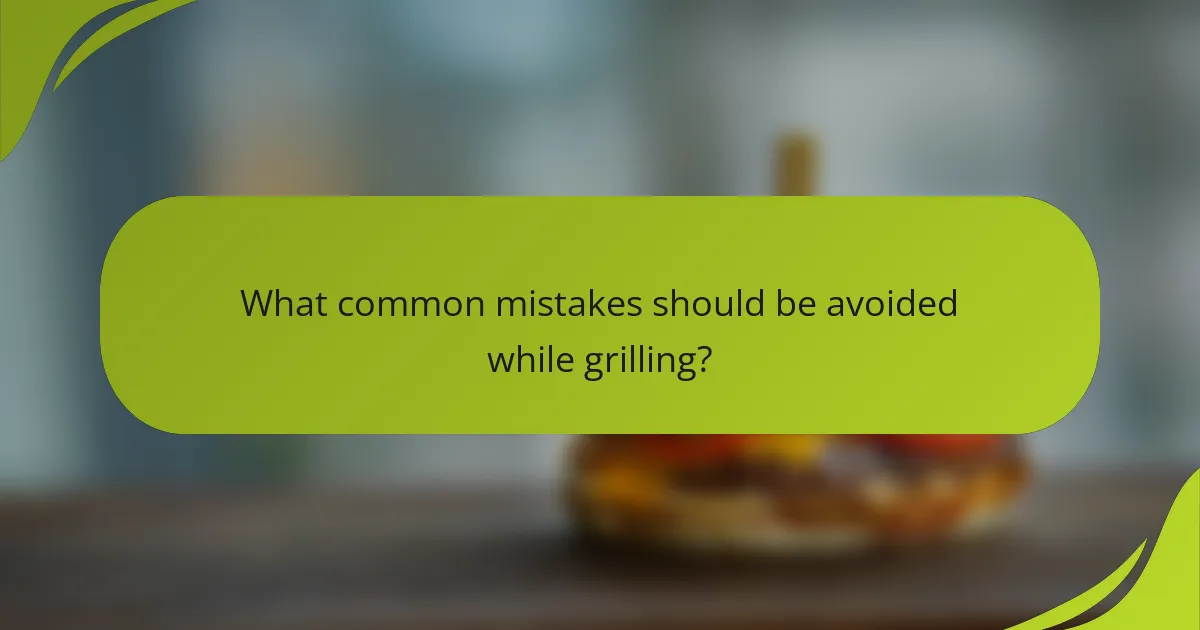Grilling techniques encompass direct grilling, indirect grilling, and smoking, each suited for different types of food and cooking methods. Direct grilling is optimal for quick-cooking items like burgers and steaks, while indirect grilling is ideal for larger cuts of meat, such as roasts or whole chickens. Smoking enhances flavor through the use of wood chips at lower temperatures. Flavor enhancements, including marinades, rubs, and sauces, play a crucial role in intensifying taste and aroma, while common grilling mistakes, such as not preheating the grill or overcrowding, can negatively affect cooking results. Understanding these techniques and tips can lead to a more enjoyable grilling experience.

What are the fundamental grilling techniques?
The fundamental grilling techniques include direct grilling, indirect grilling, and smoking. Direct grilling involves cooking food over high heat directly above the flame. This method is ideal for quick-cooking items like burgers and steaks. Indirect grilling uses heat from the side, allowing for slower cooking of larger cuts of meat. This technique is effective for roasts or whole chickens. Smoking incorporates wood chips to infuse flavor while cooking at lower temperatures. Each technique serves different types of food and desired flavors.
How do different grilling methods impact food flavor?
Different grilling methods significantly impact food flavor. Direct grilling produces a charred, smoky flavor due to high heat and direct flame contact. Indirect grilling, on the other hand, allows for slower cooking, enhancing tenderness and allowing flavors to meld. Smoking infuses food with a rich, deep flavor from wood chips. Each method alters the Maillard reaction, which is responsible for browning and flavor development. For example, studies show that grilling meats at high temperatures can create more complex flavor compounds. Additionally, marinating before grilling can enhance flavor absorption, regardless of the method used.
What are the key differences between direct and indirect grilling?
Direct grilling involves cooking food over direct heat, while indirect grilling cooks food beside the heat source. In direct grilling, food is placed directly over the flames, allowing for quick cooking and searing. This method is ideal for smaller cuts of meat and vegetables that require high temperatures. Indirect grilling, on the other hand, uses a heat source on one side of the grill, creating a convection effect. This technique is suitable for larger cuts of meat that need longer cooking times without burning. Direct grilling leads to a charred exterior and caramelization, while indirect grilling results in evenly cooked food with a tender texture.
How does temperature control influence grilling outcomes?
Temperature control significantly influences grilling outcomes by affecting the cooking process and flavor development. Proper temperature management ensures even cooking of food. High temperatures can create a sear, locking in juices and enhancing flavor. Conversely, low temperatures allow for slow cooking, which can tenderize tougher cuts of meat.
Research indicates that cooking meat at optimal temperatures can reduce the formation of harmful compounds. The USDA recommends specific internal temperature guidelines for safety and quality. For instance, chicken should reach 165°F to ensure it is safe to eat.
In summary, maintaining the right temperature during grilling is crucial for achieving desirable textures and flavors while ensuring food safety.
What essential tips can enhance grilling skills?
To enhance grilling skills, focus on proper temperature control. Maintaining the right heat ensures even cooking and prevents burning. Use a reliable thermometer to monitor internal temperatures of meats. Preheating the grill is essential for better searing and flavor development. Always clean the grill grates before cooking to prevent sticking. Marinating meats can add flavor and tenderness. Practice patience by allowing food to rest after cooking for optimal juiciness. Lastly, experiment with different wood chips for added smoke flavor. These practices are supported by culinary experts who emphasize the importance of technique in achieving great grilling results.
How important is marinating for grilled meats?
Marinating is essential for grilled meats. It enhances flavor and tenderness significantly. Marinades typically contain acids, oils, and seasonings. The acid breaks down proteins, making the meat more tender. Oils help retain moisture during cooking. Seasonings infuse the meat with flavor. Studies show marinated meats are juicier and more flavorful than unmarinated ones. For example, a study published in the Journal of Food Science found that marinated chicken had a higher moisture content after grilling. This demonstrates that marinating is crucial for achieving optimal taste and texture in grilled meats.
What role does resting time play after grilling?
Resting time after grilling allows meat to retain its juices. When meat is cooked, the juices are pushed toward the center. Resting redistributes these juices throughout the meat. This process enhances the flavor and moisture of the final product. Typically, resting should last at least 5 to 10 minutes for smaller cuts. Larger cuts may require 15 to 30 minutes. Research indicates that resting can improve tenderness and overall eating experience. For example, a study published in the Journal of Food Science found that resting significantly increases juiciness in grilled meats.
What equipment is necessary for effective grilling?
To grill effectively, essential equipment includes a grill, fuel source, and utensils. A grill can be charcoal, gas, or electric. Charcoal grills provide a smoky flavor, while gas grills offer convenience. Utensils such as tongs, spatulas, and brushes are necessary for safe handling and cleaning. A meat thermometer ensures proper cooking temperatures for safety. Grill covers protect the equipment from weather elements. Additionally, a grilling basket helps with small or delicate items. These tools collectively enhance the grilling experience by ensuring safety, flavor, and efficiency.
What types of grills are available and how do they differ?
There are several types of grills available, each differing in fuel source, cooking method, and flavor profile. Gas grills use propane or natural gas. They heat quickly and offer precise temperature control. Charcoal grills use charcoal briquettes or lump charcoal. They provide a smoky flavor but take longer to heat. Electric grills use electricity as a power source. They are ideal for indoor use and are easy to clean. Pellet grills utilize wood pellets for fuel. They combine grilling and smoking, offering a rich flavor. Each grill type has its unique advantages and is suited for different cooking styles.
What essential tools should every griller have?
Every griller should have essential tools to ensure successful grilling. A good-quality grill is fundamental for cooking. Grill tongs are necessary for flipping and moving food safely. A spatula helps in lifting and serving burgers and delicate items. A grill brush is important for maintaining cleanliness and hygiene. Instant-read thermometers ensure food is cooked to the right temperature. Basting brushes are useful for applying marinades and sauces. Heat-resistant gloves protect hands from burns. Finally, a sturdy cutting board aids in food preparation. These tools enhance the grilling experience and ensure safety and efficiency.

How can flavor enhancements improve grilled dishes?
Flavor enhancements can significantly improve grilled dishes by intensifying their taste and aroma. Marinades, rubs, and sauces add depth to the flavor profile. For instance, a marinade containing acids like vinegar or citrus can tenderize meat while infusing it with flavor. Spices and herbs in rubs create a crust that locks in moisture and adds complexity.
According to a study published in the Journal of Food Science, marinating meats can enhance flavor compounds and improve overall palatability. Additionally, the Maillard reaction, which occurs during grilling, is influenced by flavor enhancements, resulting in more appealing colors and aromas. This combination of techniques leads to a more enjoyable dining experience.
What are the most popular flavor-enhancing techniques for grilling?
The most popular flavor-enhancing techniques for grilling include marinating, dry rubbing, and smoking. Marinating involves soaking food in a flavorful liquid prior to grilling. This technique can infuse meats with herbs, spices, and acids, enhancing overall taste. Dry rubbing applies a mixture of spices directly onto the surface of the food. This method creates a flavorful crust during cooking. Smoking adds a distinct flavor by using wood chips or chunks, which impart unique tastes to the grilled items. Each technique can significantly elevate the flavor profile of grilled dishes, making them more enjoyable.
How do wood chips and charcoal affect flavor profiles?
Wood chips and charcoal significantly influence the flavor profiles of grilled food. Wood chips impart distinct flavors based on the type of wood used. For instance, hickory adds a strong, smoky taste, while applewood provides a sweeter, milder flavor. Charcoal, particularly lump charcoal, contributes a subtle smokiness and enhances the overall depth of flavor. The combustion of charcoal generates heat and smoke, which interacts with the food, creating complex flavors. Studies show that the type of fuel can alter the chemical composition of the smoke, affecting the taste. Therefore, selecting the right wood chips and charcoal is crucial for achieving desired flavor outcomes in grilling.
What spices and rubs work best for grilling?
The best spices and rubs for grilling include paprika, garlic powder, onion powder, and black pepper. Paprika adds a mild sweetness and vibrant color to meats. Garlic powder enhances flavor with its strong, aromatic profile. Onion powder provides a subtle sweetness and depth. Black pepper adds heat and pungency to dishes. Additionally, cumin and chili powder can bring warmth and complexity. A blend of these spices can create a well-rounded rub. For example, a popular mix is a combination of brown sugar, paprika, and cayenne pepper. This mix balances sweetness with heat, making it ideal for grilled meats.
How can sauces and marinades elevate grilled meals?
Sauces and marinades enhance grilled meals by adding flavor, moisture, and complexity. They penetrate the meat, enriching it with spices and herbs. Marinades often contain acidic components, which can tenderize proteins. This results in a juicier and more flavorful dish. Sauces provide a finishing touch, often adding sweetness or heat. They can complement the smoky flavors from grilling. Studies show that marinating meat can reduce harmful compounds formed during grilling. This makes the meal not only tastier but also healthier.
What are the best homemade marinades for different proteins?
The best homemade marinades for different proteins include specific combinations of ingredients tailored to enhance flavor. For chicken, a marinade of olive oil, lemon juice, garlic, and herbs is effective. This combination tenderizes the meat and adds zest. For beef, a marinade with soy sauce, brown sugar, garlic, and ginger enhances umami and caramelization. Pork benefits from a marinade of apple cider vinegar, honey, and mustard, which balances sweetness and acidity. Fish marinades often include citrus juices, olive oil, and fresh herbs to complement delicate flavors. Each marinade should ideally be used for at least 30 minutes to maximize flavor absorption.
How can sauces be used effectively during grilling?
Sauces can enhance flavor and moisture during grilling. They can be applied as marinades before grilling to tenderize and infuse meat with flavor. For example, acidic ingredients like vinegar or citrus juices help break down proteins. Basting sauces can be used during grilling to keep food moist and add layers of flavor. Applying sauces in the last few minutes of grilling prevents burning while maintaining flavor. Barbecue sauces can caramelize on the surface, creating a flavorful crust. According to a study by the National Barbecue Association, using sauces effectively can elevate the overall taste of grilled dishes.

What common mistakes should be avoided while grilling?
Common mistakes to avoid while grilling include not preheating the grill. Preheating ensures even cooking and prevents sticking. Another mistake is using the wrong type of fuel. Charcoal and gas each have specific flavor profiles and heat levels. Flipping meat too often can lead to uneven cooking. It’s best to flip once for optimal searing. Not letting the meat rest after grilling is also common. Resting allows juices to redistribute for better flavor. Ignoring food safety practices can lead to contamination. Always use separate utensils for raw and cooked foods. Lastly, overcrowding the grill can trap steam and prevent proper browning. Allow space for air circulation for better results.
What are the pitfalls of improper grilling techniques?
Improper grilling techniques can lead to food safety issues, uneven cooking, and poor flavor. Food safety is compromised when meats are undercooked, increasing the risk of foodborne illnesses. For example, ground meats should reach an internal temperature of 160°F to be safe. Uneven cooking occurs when heat distribution is not managed, resulting in some parts being overcooked while others remain raw. This can happen if the grill is not preheated properly or if food is placed too close to the heat source. Poor flavor often results from using inadequate seasoning or cooking at the wrong temperature, which can lead to charred or dry food. Additionally, flare-ups from excess fat can create burnt flavors and unhealthy carcinogens. These pitfalls highlight the importance of mastering proper grilling techniques for safe and delicious results.
How can overcooking or undercooking impact food safety?
Overcooking or undercooking can significantly impact food safety. Overcooking can lead to the formation of harmful compounds, such as acrylamide, particularly in starchy foods. It can also dry out the food, making it less palatable and potentially leading to food waste. Undercooking, on the other hand, can leave harmful bacteria, such as Salmonella or E. coli, in the food. These bacteria can cause foodborne illnesses, which affect millions of people annually. Proper cooking temperatures are essential to kill pathogens. For example, poultry should be cooked to an internal temperature of 165°F (74°C) to ensure safety. This temperature effectively eliminates harmful bacteria and reduces the risk of foodborne illness.
What mistakes do beginners often make with grill maintenance?
Beginners often make several mistakes with grill maintenance. One common mistake is neglecting to clean the grill after each use. This can lead to grease buildup and affect the flavor of food. Another mistake is failing to check and replace worn-out parts, such as burners or hoses. This can result in uneven heating or safety hazards. Additionally, beginners may overlook the importance of properly covering the grill when not in use. This can expose it to weather elements and cause rust. Lastly, many beginners do not perform regular inspections for gas leaks. This oversight can pose serious safety risks. Proper maintenance involves cleaning, inspecting, and protecting the grill to ensure longevity and safe operation.
What are the best practices for grilling success?
The best practices for grilling success include proper preparation, temperature control, and food safety. Begin by preheating the grill to the appropriate temperature for the type of food. For meats, a high heat sears the exterior while locking in juices. Use a meat thermometer to ensure food reaches safe internal temperatures.
Marinating or seasoning food before grilling enhances flavor and tenderness. Keep the grill clean to prevent sticking and flare-ups. Use direct heat for quick-cooking foods and indirect heat for larger cuts. Allow meat to rest after grilling to redistribute juices.
Following these practices can significantly improve grilling outcomes and ensure delicious results.
How can planning and preparation enhance the grilling experience?
Planning and preparation enhance the grilling experience by ensuring efficiency and flavor. Proper planning allows for the selection of the right ingredients and equipment. Preparing marinades or rubs in advance maximizes flavor absorption in meats. Organizing tools and utensils beforehand minimizes distractions during grilling. Preheating the grill ensures optimal cooking temperatures. Having a timeline for cooking different items prevents overcooking or undercooking. Research shows that 70% of successful grilling depends on preparation (source: National Barbecue Association). This structured approach leads to a more enjoyable and successful grilling session.
What troubleshooting tips can help resolve common grilling issues?
Ensure the grill is preheated properly before cooking. This helps achieve even cooking and prevents sticking. Check the fuel source if using gas; replace or refill if necessary. For charcoal grills, ensure enough charcoal is used and it’s fully ignited. Adjust the air vents to control temperature; opening them increases heat, while closing them lowers it. If food is sticking, use a clean and oiled grill grate. For uneven cooking, rotate food during grilling for consistent heat exposure. If flare-ups occur, move food to a cooler part of the grill. Regularly clean the grill to prevent buildup that can affect performance.
Grilling Techniques encompass essential methods such as direct grilling, indirect grilling, and smoking, each impacting flavor and cooking processes. Key differences between these techniques influence food texture and taste, with temperature control playing a critical role in achieving safety and quality. Essential tips for enhancing grilling skills include proper equipment usage, effective marinating, and resting techniques. Additionally, common mistakes and best practices are highlighted to ensure successful grilling outcomes, while flavor enhancements through marinades, spices, and sauces are discussed to elevate grilled dishes.